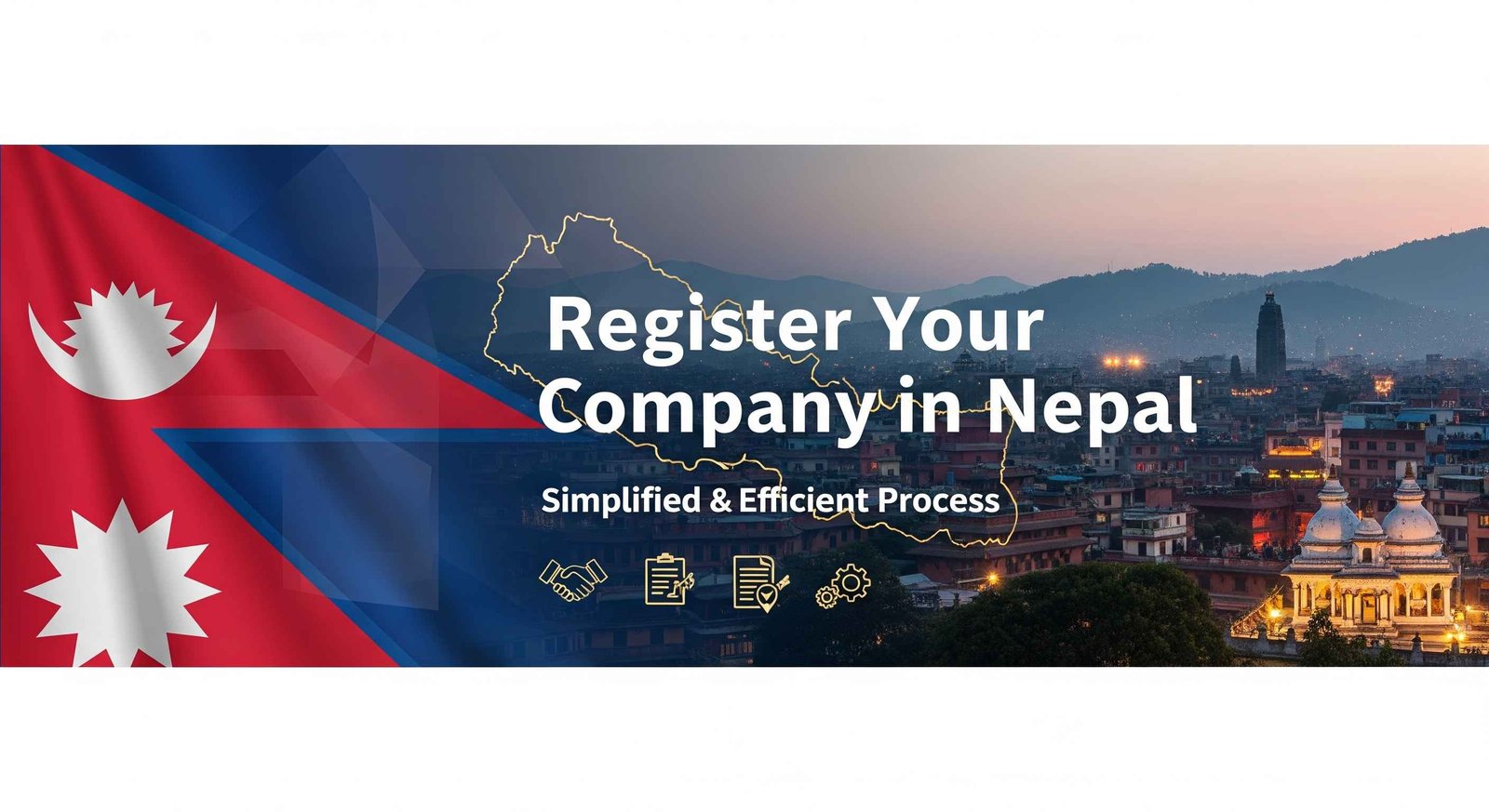- info@corporatenp.com
- World Trade Center KTM
Company Registration in Nepal

Company Registration in Nepal: Your Complete 2025 Guide
As a seasoned corporate law expert with over 15 years of experience and more than 500 successful company registrations in Nepal, I understand the challenges and opportunities that come with establishing a business in this dynamic market. Nepal's business landscape has evolved significantly, especially with the recent amendments to the Companies Act and the digital transformation of the registration process.
This comprehensive guide will walk you through everything you need to know about company registration in Nepal, whether you're a foreign investor looking to tap into Nepal's growing economy, a local entrepreneur starting your first venture, or a legal professional seeking detailed reference material.
Types of Companies You Can Register in Nepal
Understanding the different types of business entities available in Nepal is crucial for making the right decision for your venture. Based on my extensive experience working with diverse businesses, here are the main types of companies you can register:
Private Limited Company
The most popular choice for small to medium-sized businesses in Nepal, a private limited company offers several advantages:
- Shareholder Structure: Minimum 1 and maximum 101 shareholders (increased from previous limit)
- Limited Liability: Shareholders' liability is limited to their investment amount
- Capital Requirements: Minimum authorized capital of NPR 100,000
- Fundraising: Cannot raise funds from the general public
- Regulatory Burden: Less compliance requirements compared to public companies
Public Limited Company
Ideal for larger businesses planning to raise capital from the public:
- Shareholder Structure: Minimum 7 shareholders, no maximum limit
- Capital Requirements: Minimum authorized capital of NPR 10,000,000
- Fundraising: Can issue shares, bonds, and debentures to the public
- Regulatory Burden: Stricter compliance requirements and disclosures
- Mandatory For: Banking, financial institutions, insurance, stock exchanges, pension funds, and mutual funds
Non-Profit Distributing Company
Established for social, charitable, or public utility purposes:
- Objectives: Development of professions, protection of collective rights, scientific/academic/social/benevolent objectives
- Profit Distribution: Profits must be used for company objectives, not distributed to members
- Tax Benefits: May qualify for certain tax exemptions
Foreign Company (Branch Office)
For foreign companies looking to establish a presence in Nepal:
- Parent Company: Must be incorporated outside Nepal
- Approval: Requires approval from the Department of Industry
- Liability: Parent company remains liable for the branch's obligations
Single-Person Company
A relatively new concept in Nepal, perfect for solo entrepreneurs:
- Ownership: Single individual owns the company
- Liability: Limited liability protection for the owner
- Compliance: Simpler compliance requirements compared to other company types
Recent Amendments to Nepal's Companies Act (2024-2025)
Having navigated Nepal's corporate landscape for over 15 years, I've witnessed numerous regulatory changes. The most significant recent amendments came through the "Ordinance for Amendment of Certain Nepali Acts for Improvement of Financial and Business Environment and Advancement of Investment 2025," which introduced groundbreaking changes that many competitors haven't yet addressed:
1. NRNs Recognized as Eligible Promoters
What Changed: Non-Resident Nepalis (NRNs) can now act as company promoters by submitting their NRN Citizenship Certificate.
Why It Matters: This opens doors for the Nepali diaspora to invest in and contribute to Nepal's economy. I've already helped several NRN clients establish businesses in Nepal's technology and tourism sectors under this new provision.
Practical Tip: Ensure your NRN Citizenship Certificate is valid and issued according to Nepal's immigration laws to avoid registration delays.
2. Innovative Share Issuance Mechanisms
What Changed: Companies can now issue shares for non-cash contributions such as intellectual property, goodwill, or technical know-how (sweat equity).
Why It Matters: This is particularly beneficial for startups and innovative businesses that may have valuable intangible assets but limited cash.
Key Provisions:
- Startups can allocate up to 40% of paid-up capital for non-cash shares (compared to 20% for other companies)
- All non-cash contributions must be valued by a certified engineer or accountant
- Companies must document valuation reasons during AGMs or when submitting to the Company Registrar's Office
Real-World Application: I recently assisted a software startup in allocating shares to a co-founder who contributed a patented AI algorithm, valued by an independent engineer, instead of requiring cash investments upfront.
3. Employee Stock Option Plans (ESOPs)
What Changed: The ordinance introduces formal ESOPs, allowing companies to issue shares as part of employee remuneration.
Key Requirements:
- Special resolution passed during Annual General Meeting (AGM)
- Lock-in periods prevent immediate resale
- Employee participation is voluntary
Benefits:
- Enhanced talent retention
- Cost-effective incentives (conserves cash for operations)
- Aligns employee interests with company success
Tax Consideration: Shares allotted under ESOPs may be treated as taxable income for employees under Nepal's income tax laws.
4. Simplified Premium Share Issuance
What Changed: The requirement to submit three years of audited financial statements has been removed for premium share issuance.
Impact: This makes it significantly easier for newer companies to attract investments without delays, reducing bureaucracy and accelerating fundraising opportunities.
5. Enhanced Role of AGMs
What Changed: Annual General Meetings now have a more significant role in decision-making, with special resolutions required for decisions like non-cash share issuance and ESOP implementation.
Private Company Exception: Private companies may not need to hold formal AGMs if permitted by their Articles of Association, allowing for written resolutions instead.
Digital Transformation of Company Registration in Nepal
One of the most significant developments I've witnessed in my 15+ years of practice is the digital transformation of Nepal's company registration process. The Office of the Company Registrar (OCR) has implemented several technological advancements that have revolutionized how businesses are registered:
CAMIS System Implementation
The OCR launched the Company Administration and Management Information System (CAMIS), which has dramatically streamlined the registration process:
Before Digital Transformation:
- Registration process took up to 15 days
- Multiple physical visits to government offices required
- Extensive paperwork and manual verification
After CAMIS Implementation:
- Registration can be completed within 15 minutes for complete applications
- Online submission of all documents
- Real-time status tracking
- Digital verification and approval process
Digital Signature Mandate
The OCR has implemented a new digital signature system for corporate services, marking a pivotal shift in Nepal's business administration landscape:
Benefits:
- Enhanced document security
- Faster processing times
- Reduced physical paperwork
- Remote authentication capability
Implementation Timeline: The system is being rolled out in phases, with full integration expected by mid-2025.
Online Payment Integration
The registration fee payment process has been digitized:
Payment Options:
- Online payment through OCR's portal
- Designated banks with digital integration
- Real-time payment confirmation
Impact: This has eliminated payment delays and reduced the risk of payment-related application rejections.
Step-by-Step Company Registration Process in Nepal
Based on my experience facilitating 500+ company registrations, here's the detailed process for registering a company in Nepal:
Step 1: Company Name Reservation
Process:
- Visit the OCR portal at camis.ocr.gov.np
- Check name availability through the online system
- Submit your proposed company name with alternatives
- Pay the name reservation fee (approximately NPR 500-1000)
Timeline: 1-2 working days Success Rate: 95% when following proper naming guidelines
Expert Tips:
- Choose a name that reflects your business activity
- Avoid names similar to existing companies
- Ensure the name complies with Nepal's cultural and legal norms
- Have 2-3 alternative names ready
Step 2: Document Preparation
Required Documents for Local Investors:
- Application Form for Company Registration
- Memorandum of Association (MOA) - 2 sets original
- Articles of Association (AOA) - 2 sets original
- National Identity Card copies of all shareholders
- Citizenship certificates of shareholders
- Shareholder's agreement (if any)
- Proof of proposed registered office address
Additional Documents for Foreign Investors:
- Copy of passport (notarized)
- Visa documents
- Company incorporation certificate of parent company (notarized)
- Memorandum and Articles of Association of parent company (notarized)
- Company profile of investing company
- Financial Credibility Certificate (FCC) from home country bank
- Latest audit report (notarized)
- Resolution of investor for investing in Nepal
- Power of attorney authorizing representatives
- Joint Venture Agreement (if applicable)
Document Preparation Time: 3-5 working days Professional Assistance: Highly recommended for foreign investors and complex structures
Step 3: Online Submission
Process:
- Create an account on camis.ocr.gov.np
- Fill in the online application form with company details
- Upload all required documents in specified format
- Review and submit the application
Technical Requirements:
- Documents should be in PDF format
- Maximum file size: 5MB per document
- Clear scans of all documents
Common Mistakes to Avoid:
- Incomplete information in the application form
- Uploading unclear document scans
- Missing signatures on documents
- Incorrect shareholder details
Step 4: Fee Payment
Registration Fees for Private Companies:
| Authorized Capital (NPR) | Registration Fee (NPR) |
|---|---|
| Up to 100,000 | 1,000 |
| 100,001 - 500,000 | 4,500 |
| 500,001 - 2,500,000 | 9,500 |
| 2,500,001 - 10,000,000 | 16,000 |
| 10,000,001 - 20,000,000 | 19,000 |
| 20,000,001 - 30,000,000 | 22,000 |
| 30,000,001 - 40,000,000 | 25,000 |
| 40,000,001 - 50,000,000 | 28,000 |
| 50,000,001 - 60,000,000 | 31,000 |
| 60,000,001 - 70,000,000 | 34,000 |
| 70,000,001 - 80,000,000 | 37,000 |
| 80,000,001 - 90,000,000 | 40,000 |
| 90,000,001 - 100,000,000 | 43,000 |
| Above 100,000,000 | 30 per 100,000 |
Registration Fees for Public Companies:
| Authorized Capital (NPR) | Registration Fee (NPR) |
|---|---|
| Up to 100,000,000 | 15,000 |
| 100,000,001 - 1,000,000,000 | 40,000 |
| 1,000,000,001 - 2,000,000,000 | 70,000 |
| 2,000,000,001 - 3,000,000,000 | 100,000 |
| 3,000,000,001 - 4,000,000,000 | 130,000 |
| 4,000,000,001 - 5,000,000,000 | 160,000 |
| Above 5,000,000,000 | 3,000 per 100,000 |
Payment Methods:
- Online payment through OCR portal
- Designated banks (Global IME Bank, Nabil Bank, Nepal Investment Bank)
- Payment confirmation is immediate
Step 5: OCR Review and Approval
Process:
- OCR officials review submitted documents
- Verification of legal compliance
- Checking for completeness and accuracy
- Approval or request for additional information
Review Timeline: 3-7 working days Success Rate: 85% on first submission with proper documentation
Common Reasons for Rejection:
- Incomplete documentation
- Non-compliance with Companies Act provisions
- Name availability issues
- Incorrect fee payment
Expert Tip: Ensure all documents are properly signed, stamped, and notarized where required to avoid delays.
Step 6: Certificate Issuance
Process:
- Upon successful review, OCR issues Certificate of Incorporation
- Certificate is available for download from the online portal
- Physical certificate can be collected from OCR office
Timeline: 1-2 working days after approval Validity: Certificate is valid indefinitely unless company is dissolved
What the Certificate Contains:
- Company registration number
- Company name
- Registered office address
- Date of incorporation
- Type of company
- Authorized capital
Step 7: Post-Registration Compliance
Immediate Requirements:
- PAN Registration: Obtain Permanent Account Number from Inland Revenue Department
- VAT Registration: Mandatory if annual turnover exceeds NPR 5 million
- Local Ward Registration: Register with local municipal office
- Bank Account Opening: Open corporate bank account
- Company Stamp: Create official company stamp (NPR 300-500)
Timeline for Post-Registration: 5-7 working days Professional Assistance: Recommended for efficient completion
Special Considerations for Foreign Investors
Having assisted numerous foreign investors navigate Nepal's regulatory environment, I understand the unique challenges they face. Here's what foreign investors need to know:
Foreign Direct Investment (FDI) Approval Process
Foreign investors must obtain FDI approval before registering a company in Nepal:
Approval Authorities:
- Department of Industry (DOI): For investments up to NPR 6 billion
- Investment Board of Nepal (IBN): For investments above NPR 6 billion and hydropower projects over 200 MW
FDI Approval Process (9 Steps):
- Obtain Foreign Investment Approval from DOI or IBN
- Register company at Office of Company Registrar
- Tax Registration at Inland Revenue Office
- Business Registration at Local Ward Office
- Obtain recommendation letter from Local Ward Office for Industry Registration
- Register industry before Department of Industry
- Obtain "non-black certificate" from Credit Information Bureau
- Open local bank account
- Record investment amount before Nepal Rastra Bank
Timeline: 3-5 months for complete FDI approval and registration
Minimum Capital Requirements
General Requirement: NPR 20 million (approx. USD 153,846) Exception: IT companies have no minimum investment requirement
Investment Injection Timeline:
| Stage | Timeline | Percentage of Investment |
|---|---|---|
| Stage I | Within 1 year of approval | 10-25% (based on investment amount) |
| Stage II | When production/commercial transaction starts | Up to 70% |
| Stage III | After 2 years of production | Remaining 30% |
Sectors Restricted for Foreign Investment
Foreign investment is NOT permitted in the following sectors:
Primary Production:
- Poultry farming, fisheries, bee-keeping
- Fruits, vegetables, oil seeds, pulse seeds, milk industry
- Other primary agro-production sectors
Small Industries:
- Cottage and small industries
- Personal service businesses (hair cutting, tailoring, driving, etc.)
Sensitive Sectors:
- Arms, ammunition, explosives manufacturing
- Nuclear, biological, and chemical weapons
- Atomic energy and radioactive materials
Service Sectors:
- Real estate business (excluding construction)
- Retail business
- Internal courier service
- Local catering service
- Moneychanger and remittance services
- Travel agencies, tourism guides, trekking and mountaineering guides
- Rural tourism including homestay
- Mass communication media (newspapers, radio, television, online news)
- Motion pictures in national language
- Management, account, engineering, legal consultancy services
- Language, music, and computer training
- Consultancy services with foreign investment exceeding 51%
Investment Capping in Certain Sectors
Some sectors allow foreign investment but with ownership restrictions:
| Sector | Maximum Foreign Ownership |
|---|---|
| Telecommunication | 80% |
| Banking and Financial Institutions | 85% (minimum 20% domestic) |
| Insurance Companies | 80% |
| Consultancy Business | 51% |
Sector-Specific Approvals
Certain businesses require additional licenses even after FDI approval:
| Business Type | Regulatory Authority |
|---|---|
| Colleges | Affiliated University |
| Insurance Company | Nepal Insurance Authority |
| Bank and Financial Institution | Nepal Rastra Bank |
| Hydropower | Department of Electricity Development |
| Travel and Trekking | Ministry of Tourism, Culture and Civil Aviation |
| Food Industries | Department of Food Technology and Quality Control |
| Telecommunication | Nepal Telecommunication Authority |
Common Challenges and Solutions
Based on my experience with 500+ company registrations, here are the most common challenges entrepreneurs face and how to overcome them:
Challenge 1: Document Preparation Errors
Common Issues:
- Incorrect formatting of MOA and AOA
- Missing signatures or stamps
- Incomplete shareholder information
- Improper notarization of foreign documents
Solutions:
- Use professional templates for MOA and AOA
- Create a document checklist before submission
- Hire a local legal expert for document verification
- Allow extra time for document authentication from home country
Challenge 2: Name Reservation Rejection
Common Reasons:
- Similarity with existing company names
- Non-compliance with naming guidelines
- Cultural or regulatory sensitivity issues
Solutions:
- Conduct thorough name research before application
- Prepare 3-5 alternative names
- Avoid names that could be culturally sensitive
- Consider professional name screening services
Challenge 3: Delays in FDI Approval
Common Causes:
- Incomplete application documentation
- Additional information requests from authorities
- Coordination issues between different government agencies
- Changes in regulatory requirements during processing
Solutions:
- Engage experienced local consultants
- Maintain regular follow-up with authorities
- Prepare for potential additional document requests
- Build in buffer time for unexpected delays
Challenge 4: Post-Registration Compliance Confusion
Common Issues:
- Uncertainty about ongoing compliance requirements
- Missed filing deadlines
- Incorrect tax calculations
- Lack of understanding about annual meeting requirements
Solutions:
- Create a compliance calendar with all important dates
- Engage professional accounting services
- Subscribe to regulatory update services
- Consider outsourcing compliance management
Post-Registration Requirements and Compliance
Registering your company is just the beginning. Based on my experience helping businesses maintain compliance, here are the ongoing requirements:
Immediate Post-Registration Actions
1. Tax Registrations:
- PAN Registration: Mandatory for all companies
- VAT Registration: Required if annual turnover exceeds NPR 5 million
- Income Tax Registration: Automatic with PAN registration
2. Banking Requirements:
- Open corporate bank account with authorized capital
- Obtain internet banking facilities
- Set up payroll processing systems
3. Local Registrations:
- Municipal registration for business operation
- Industry-specific license applications
- Environmental clearance if applicable
Ongoing Compliance Requirements
Annual Filings:
- Annual returns to OCR within 3 months of fiscal year-end
- Audited financial statements submission
- Tax returns filing
- VAT returns (monthly/quarterly based on turnover)
Meeting Requirements:
- Annual General Meeting (AGM): Mandatory for public companies
- Board Meetings: At least quarterly for most companies
- Special Meetings: As required for major decisions
Record Keeping:
- Maintain proper books of accounts
- Keep minutes of all meetings
- Preserve registration documents
- Maintain employee records and tax filings
Compliance Timeline:
| Requirement | Frequency | Deadline |
|---|---|---|
| Annual Return to OCR | Annual | Within 3 months of fiscal year-end |
| Tax Return | Annual | By end of Ashad (July) for previous fiscal year |
| VAT Return | Monthly/Quarterly | 25th of following month |
| AGM | Annual | Within 6 months of fiscal year-end |
| Board Meeting | Quarterly | No specific deadline, but regular intervals required |
Penalties for Non-Compliance
Financial Penalties:
- Late filing fees: NPR 100-500 per day
- Non-compliance penalties: Up to NPR 50,000
- Tax penalties: Up to 25% of tax due
Legal Consequences:
- Company dissolution for continued non-compliance
- Director disqualification
- Legal proceedings for serious violations
Reputational Impact:
- Difficulty in obtaining future approvals
- Challenges in securing bank financing
- Negative impact on business relationships
Success Stories: Learning from Experience
Having facilitated 500+ company registrations, I've seen various businesses succeed by navigating the registration process effectively. Here are some illustrative examples:
Case Study 1: Tech Startup Success
Background: A group of young Nepali entrepreneurs wanted to establish a technology startup focusing on AI solutions.
Challenge: Limited initial capital but valuable intellectual property.
Solution: Utilized the new provision for non-cash share issuance, allocating 35% of paid-up capital for the founder's AI algorithm.
Outcome:
- Registered within 7 days
- Successfully attracted angel investment
- Now employing 25+ professionals
- Expanded operations to two additional cities
Key Learning: The recent amendments allowing non-cash share issuance can be particularly beneficial for technology and knowledge-based startups.
Case Study 2: Foreign Investor Success
Background: A European manufacturing company wanted to establish a production facility in Nepal.
Challenge: Navigating the FDI approval process and understanding local regulations.
Solution: Engaged local experts for end-to-end assistance, from FDI application to post-registration compliance.
Outcome:
- FDI approval obtained in 4 months
- Company registered and operational within 5 months
- Created 150+ local jobs
- Successfully exporting to neighboring countries
Key Learning: Professional guidance can significantly reduce the time and stress involved in FDI approval and company registration.
Case Study 3: NRN Entrepreneur Success
Background: An NRN professional based in the US wanted to establish a tourism-related business in Nepal.
Challenge: Understanding the new provisions for NRN promoters and navigating the process from abroad.
Solution: Leveraged the new NRN promoter provisions and used digital submission processes.
Outcome:
- Registered as promoter using NRN Citizenship Certificate
- Business operational within 3 months of initial application
- Successfully connecting tourists with authentic local experiences
- Planning expansion to multiple locations
Key Learning: The new provisions for NRN promoters have opened significant opportunities for the Nepali diaspora to invest in their home country.
Frequently Asked Questions
Based on my 15+ years of experience, here are answers to the most common questions about company registration in Nepal:
For Foreign Investors
Q: Can foreigners fully own a company in Nepal? A: Yes, foreigners can own 100% of companies in most sectors, except for restricted areas like telecommunication (80%), banking (85%), insurance (80%), and consultancy services (51%).
Q: What is the minimum investment required for foreign investors? A: The minimum capital requirement is NPR 20 million (approx. USD 153,846), except for IT companies which have no minimum investment requirement.
Q: How long does the complete FDI approval and registration process take? A: The entire process typically takes 3-5 months, depending on the complexity of the business and completeness of documentation.
Q: Can I register a company remotely without visiting Nepal? A: While the digital transformation has made many steps possible remotely, certain requirements like opening bank accounts and some document verifications may require physical presence or authorized representatives.
For Local Entrepreneurs
Q: What is the minimum capital required for a private company? A: The minimum authorized capital for a private company is NPR 100,000.
Q: How many shareholders are required for a private company? A: A private company can be formed with a minimum of 1 shareholder and a maximum of 101 shareholders.
Q: How long does the company registration process take for local investors? A: With proper documentation, the registration process typically takes 7-10 working days for local investors.
Q: What are the ongoing compliance requirements after registration? A: Key requirements include annual returns to OCR, tax filings, maintaining proper books of accounts, and holding required meetings (AGM for public companies).
For Legal Professionals
Q: What are the key changes in the recent Companies Act amendments? A: Major changes include NRNs as eligible promoters, non-cash share issuance (up to 40% for startups), ESOP provisions, simplified premium share issuance, and enhanced AGM roles.
Q: What are the implications of the digital transformation at OCR? A: The CAMIS system has significantly reduced processing times (from 15 days to as little as 15 minutes), enabled online submissions, and introduced digital signatures for enhanced security.
Q: What are the common compliance pitfalls to watch for? A: Common issues include missed filing deadlines, improper document maintenance, incorrect tax calculations, and failure to hold required meetings.
Q: How have the recent amendments affected corporate governance requirements? A: The amendments have strengthened the role of AGMs in decision-making, particularly for non-cash share issuance and ESOP implementation, while providing flexibility for private companies regarding formal AGM requirements.
Conclusion: Your Path to Successful Company Registration in Nepal
Company registration in Nepal has evolved significantly, with recent amendments to the Companies Act and digital transformation making the process more accessible and efficient. Whether you're a foreign investor, local entrepreneur, or legal professional, understanding the current landscape is crucial for success.
With 15+ years of experience and 500+ successful company registrations, I've seen firsthand how proper guidance and preparation can make the difference between a smooth registration process and a challenging one. The recent regulatory changes have created new opportunities, particularly for NRNs, startups, and innovative businesses.
Key Takeaways:
- Stay Updated: Regulatory changes are frequent, so ensure you have the latest information
- Leverage Digital Tools: Use the CAMIS system and digital submission options for efficiency
- Plan for Compliance: Post-registration requirements are as important as the registration itself
- Seek Professional Help: Expert guidance can save time, reduce stress, and ensure compliance
Next Steps:
- Determine the most suitable company type for your business
- Prepare all necessary documents in advance
- Consider engaging professional assistance, especially for FDI cases
- Plan for post-registration compliance from the beginning
Nepal's business environment continues to improve, with the government actively working to create a more investment-friendly climate. By understanding the registration process and requirements, you're well-positioned to establish a successful business in this growing market.
Ready to start your company registration journey? Contact our team of experts for personalized guidance tailored to your specific needs and circumstances. With our extensive experience and up-to-date knowledge of Nepal's corporate landscape, we can help you navigate the process efficiently and effectively.
Disclaimer: This article is for informational purposes only and shall not be construed as legal advice. The information provided is based on the Companies Act 2063 and related regulations as of 2025. Always consult with qualified legal professionals for advice specific to your situation.






